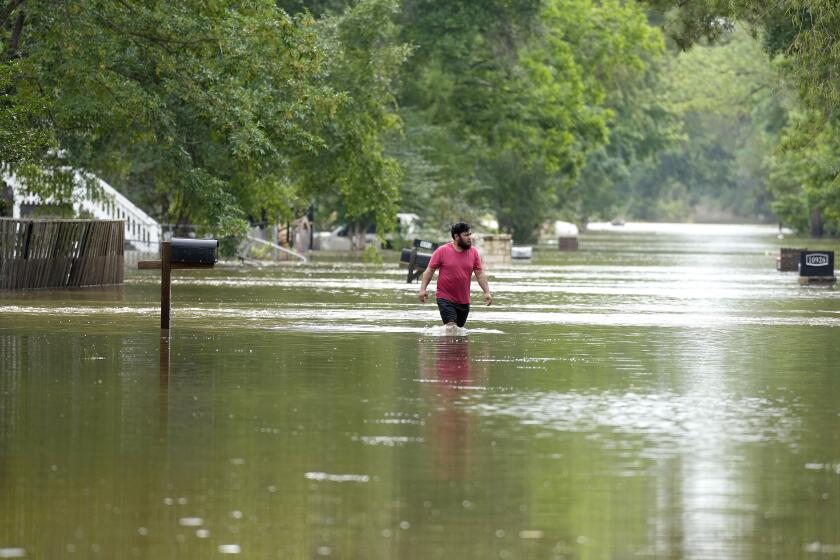Lawyer Is Dedicated to the Fight for Women’s Rights in Baja
The task of promoting equal opportunities for women in Baja California may seem overwhelming, but not to Gabriela Navarro Peraza, a mother of three and former prosecutor.
Navarro, the first director of the state’s Institute of the Woman, views her job as both an opportunity and a challenge -- especially in a country that has not traditionally supported the advancement of women, and where many women don’t see themselves as equal to men.
Since starting the institute last year, she has launched a campaign to prevent violence against women and begun a conflict-resolution program for children. She has also conducted a study on the status of women in Baja.
“Women are recognizing our efforts,” she said. “Women are waking up and saying, ‘Yes, I do have rights.’ ”
Baja California Gov. Eugenio Elorduy Walther appointed Navarro in 2002, shortly after a law established the state institute, modeled after the national institute started in 2000.
At the beginning, Navarro said, all she had was a borrowed laptop computer. By that summer, she had a budget and a staff of seven. She now works from two offices, one in Mexicali and one in Tijuana.
Initially, the institute faced opposition from conservatives who feared that it would promote prostitution and abortion.
Navarro, who personally supports a woman’s right to choose, said the institute does not promote abortion. She also said she would like to see prostitutes have alternatives for work.
“There were groups of men who were very afraid of the institute being formed as a radical, feminist institution,” said Graciela Garza Trevino, who heads the nonprofit Women for a Better World in Mexicali and works as a consultant for the institute.
One of Navarro’s first jobs was to inform politicians and government agencies about the institute and its mission. She has also made speeches around the state, in rural towns and Indian villages, telling women about their rights.
Garza said Navarro is young and has a lot of energy, which is needed to fight for women’s rights in Mexico.
“The work for women is seen as work against men,” she said, “and we are always trying to erase this idea.” The institute is also lobbying for stronger Mexican laws, Garza said.
Organizations in both Mexico and the U.S. are pitching in. The San Diego Domestic Violence Council has provided training on dealing with domestic violence to Mexican judges, police officers and politicians. And with the help of the nonprofit Center for Community Solutions in San Diego, the institute and other women’s groups are collecting domestic violence statistics and compiling a directory of services.
“We’re about 20 years down the road from where they are in Mexico,” said Steve Allen, legal director of the San Diego center, which provides services for victims of sexual assault and domestic violence. “I think they can catch up, with some assistance.”
Navarro was raised in Tijuana. Her mother didn’t work, and her father left for the U.S. when she was young, so the family depended on Navarro’s grandmother, who cleaned houses across the border.
Navarro was determined to get an education and a well-paying job. At age 20, she became one of the first women to graduate from the law school at the Universidad Autonoma de Baja California in Tijuana. Soon after graduation, she began working as a professor, teaching classes in criminal law and investigative methods.
She worked as a prosecutor handling family violence cases, a criminal court judge and head of a police division that specialized in sex crimes. She quit law enforcement in 1999 and joined the state social services agency, where she provided programs, including group therapy and a crisis hotline, for victims of family violence.
Throughout her career, said Navarro, 43, she has battled men who didn’t believe that she deserved to hold positions of authority. Police officers under her refused to follow her orders, she said, and a boss at the district attorney’s office told her that women didn’t have the intellect to be prosecutors.
Navarro has been divorced twice and has three daughters, ages 9, 12 and 14.
“If I stay home with my daughters to teach them values, where is the value of equality?” said Navarro, who has a broad smile and an expressive voice. “By working, I am teaching my daughters values.”
During her three years as institute director, Navarro plans to work on informing women about health issues, improving their access to education and helping them start their own businesses. She knows she can’t accomplish everything during such a short time but she wanted to set an ambitious agenda to improve life for Mexican women and ensure that they do not face discrimination. “These are cultural changes that we haven’t had throughout the history of Mexico,” she said. “We need to learn and build a new foundation of equality and opportunities.”
More to Read
Start your day right
Sign up for Essential California for news, features and recommendations from the L.A. Times and beyond in your inbox six days a week.
You may occasionally receive promotional content from the Los Angeles Times.






